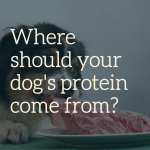Is There Any Science Behind Feeding Raw Diets?
 One of the chief arguments (or actually myths) about feeding dogs a raw diet is that there is little science behind it. How do you know if they are getting all the needed nutrients? What if the diet is “unbalanced”? Is it safe? Will the dog or people get sick from bacteria in the food? Where are the studies proving it is better than feeding dry kibble?
One of the chief arguments (or actually myths) about feeding dogs a raw diet is that there is little science behind it. How do you know if they are getting all the needed nutrients? What if the diet is “unbalanced”? Is it safe? Will the dog or people get sick from bacteria in the food? Where are the studies proving it is better than feeding dry kibble?
I hate to break it to you, but there are unlikely to be many controlled studies on raw versus kibble diet funded by pet food companies. Simply put, there’s no money in it. Costs are significant to do such research, and most industry sponsored research is done to develop a product to sell. There is no profit in studying whether fresh food is better than kibble, especially if what a company sells is kibble. It is also unlikely than many US veterinary colleges will do such research. The reason why? Most nutrition teaching in veterinary colleges is sponsored by pet food companies making kibble and canned foods — Hill’s, Purina, Royal Canin, etc. When I attended veterinary college, Hill’s was the primary “prescription” food company. Looking back, I can clearly see how they influenced vet students. From the beautiful anatomy book they gave us, to the cheap food we could buy for our pets ($10 for a 40 pound bag of Science Diet Maintenance!), to the money they gave to the student chapter of the AVMA. They also gave us helpful charts and guides for all the foods they made, for all the conditions we would treat.  Purina stepped up too, giving us a series of guides, on topics from radiology (x-ray) interpretation to urinalysis, cytology, fecals, and more. An impressive collection, chock full of images that are very helpful in everyday veterinary practice. All of these things lead veterinary students and veterinarians to trust and rely of these companies for accurate information on how best to feed pets. But can a company provide accurate and objective information if they won’t scientifically look at other dietary options, including raw and homecooked? And furthermore, when a company bashes a raw or homecooked feeding plan, without ever having studied it, can you trust them? Are they using the scientific method they claim is absent from non-kibble based feeding plans?
Purina stepped up too, giving us a series of guides, on topics from radiology (x-ray) interpretation to urinalysis, cytology, fecals, and more. An impressive collection, chock full of images that are very helpful in everyday veterinary practice. All of these things lead veterinary students and veterinarians to trust and rely of these companies for accurate information on how best to feed pets. But can a company provide accurate and objective information if they won’t scientifically look at other dietary options, including raw and homecooked? And furthermore, when a company bashes a raw or homecooked feeding plan, without ever having studied it, can you trust them? Are they using the scientific method they claim is absent from non-kibble based feeding plans?
Clearly, the only people who will be interested in comparing foods and finding out the implications of feeding a variety of diet plans will be independent scientists. And they exist! There is an amazing group of them associated with the DogRisk group, based at the veterinary college at the University of Helsinki in Finland. I first came to know of them through the Dog Cancer Series, which highlighted some of their key cancer related findings. Their work is nothing short of inspirational, and I believe will provide the scientific evidence many want to fairly evaluate the feeding a raw and kibble diets. Now they need our help to get much of their newest and most important work published. Learn more in this short video.
I urge you to visit their website, or follow them on Facebook. And support their efforts by donating and sharing their information.

 Next Post
Next Post